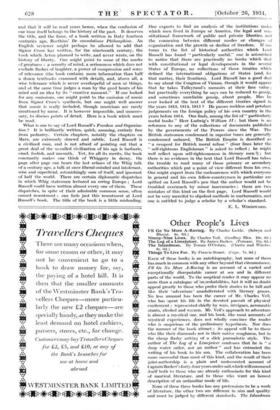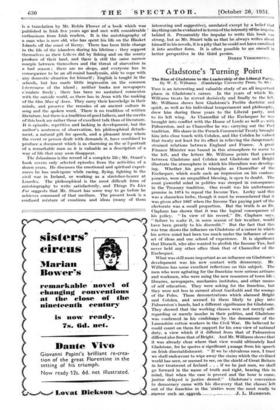Other People's Lives
Things To Live For. By Francis Stuart. (Cape. 7s. 6d.) EACH of these books is an autobiography, but none of them has much in common with any other beyond that circumstance. l'U Go No More A-Roving is an account of a varied and exceptionally disreputable career at sea and in different parts of the world. To the sceptical-reader it may appear no more than a catalogue of improbabilities, but it will no doubt appeal greatly to those who prefer their stories to be tall and like their `adventure'- unadulterated with literary graces. No less unusual has been the career of Mr. Charles Veil, who has • spent his life - in the devoted pursuit of physical excitement ; represented chiefly by wars, intrigues, aeronautic stunts, alcohol and -women. Mr. Veil's approach to adventure is almost a mystical one, and his book, like most accounts of mystical experiences, does not wholly convince the reader who is suspicious of the preliminary hypothesis. Nor does the manner of the book attract : its appeal will be to those who like their diamonds not in their native roughness, but in the cheap flashy setting of a slick journalistic style. The author of The Log of a Limejuicer confesses that he is " a deep water. sailor, not an author " and has- entrusted the writing of his book to his son. The collaboration has been more successful than most of this kind, and the result of their joint-authorship is a plain and undecorated account of Captain Barker's forty-four years under sail,which will commend itself both to those who arc already enthusiasts for this kind of nautical literature, and to those who want an honest description of an unfamiliar mode of life.
None of these three books has any pretensions to be a work of literature, the other two are different in aim and- quality and must be -judged by different standards. The Islandman is a translation by Mr. Robin Flower of a book which was published in Irish five years ago and met with considerable enthusiasm from Irish readers. It is the autobiography of a man who is now old, who has spent his life on the Blasket Islands off the coast of Kerry. There has been little change in the life of the islanders during his lifetime : they support themselves as their fzthns did by -fishing and on the scanty produce of their land, and there is still the same narrow margin between themselves and the threat of starvation in a bad season ; there are no shops, and everyone has in consequence to be an all-rotind handymen, able'to cope with any domestic' situation for himself ; English is taught in the schools, but has made little impression on the common intercourse of the island ; neither books nor newspapers circulate freely ; there has been no sustained connexion with the outside world, as there has in Aran with the making of the film Man of Aran. They carry their knowledge in their minds, and preserve the remains of an ancient culture in song and the spoken word. There is no tradition of written literature, but there is a tradition of good talkers-,'and and the merits of this book are rather those of excellent talk than of literature. It is episodic, repetitive and lacking in development, but the author's acuteness of observation, his philosophical detach- ment, a natural gift for speech, and a pleasant irony where the event or person dealt with demands it, have combined to produce a document which is as charming as the se'f-portrait of a remarkable man as it is valuable as a description of a way of life that may soon disappear.
The Islandman is the record of a complete life; Mr. Stuart's book covers only selected episodes from the activities of a dozen years. He discusses the emotional and spiritual experi- ences he has undergone while racing, flying, fighting in the civil war in Ireland, or working as a stretcher-bearer at Lourdes. The philosophical is the most difficult form of autobiography to write satisfactorily, and Things To Live For suggests that Mr. Stuart his some way to go before he achieves command of that medium. The present book is a confused mixture of emotions and ideas (many of them
interesting and suggestive), unrelated except by a belief that Anything can be evaluated in terns of the intensity 6fthe impulse behind it. Presumably the impulse to write this book was strong, but as Mi. Stuart tells us that he always writes about himself in his novels, it is a pity that he could not have canalized it into another form. It is often possible to see oneself in better perspective in the' third person.
DEREK VERSCHOYLE.























































 Previous page
Previous page